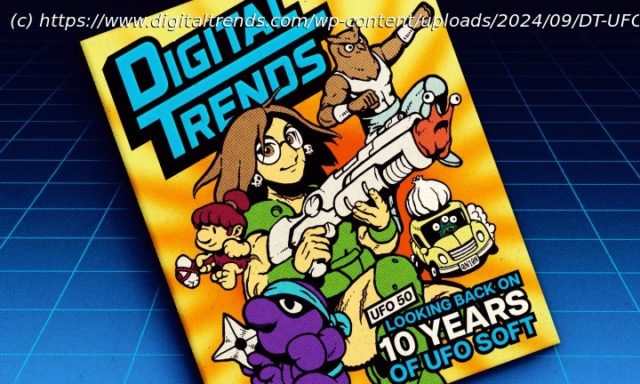UFO 50 is an unfathomably ambitious ode to the 8-bit era featuring 50 original retro games that are bursting with creativity.
[Editor’s note: UFO 50, the latest game from Spelunky developer Mossmouth, is a fascinating feat. It’s a collection of 50 original 8-bit games that both reference gaming history and iterate on it. Even with a handful of misses in the oddball package, these are lovingly crafted retro throwbacks that encapsulate what made that creative era of gaming so special. It’s also a game that is invested in creating a fiction that its players will buy into. The invented premise is that all of these games were created by a cult classic studio named UFO Soft in the 1980s. It’s a fictional company with very real roots in pioneers like Jeff Minter’s Llamasoft.
To properly communicate how well UFO 50 builds that fiction, we decided to take a structural swing of our own crafted from the same historical roots. The below review imagines a fictional Digital Trends Magazine, modeled after historic gaming publications like Zzap!64. It is both a review of all 50 games in the collection, as well as a fictional play about three critics that unfolds through their writing over an eight-year span. If you’re just here for a straight recommendation, UFO 50 will give you more value for your buck than any game released in 2024. But if you’re willing to get a little experimental with us, read on.]
Happy New Year, Trendsetters! We have a good feeling that 1992 is going to be a great year for video games, especially with the continued rise of the Super Nintendo. We’ll have plenty of great games to review this year, but before barreling forward, we wanted to take a moment to reflect. Sometimes we’re so focused on the future of tech here at Digital Trends Magazine that we lose sight of the games, developers, and lost eras that brought us so much joy. It’s with that thought that we present a very special issue.
This year marks the 10-year anniversary of UFO Soft (originally known as LX Systems). The eccentric developer was a staple of the 8-bit era, reaching cult classic status after releasing a barrage of 50 games between 1982 and 1989 on LX home computers. Its wide-ranging catalog represents what we love about video games. The bulk of these games carry an oddball creative spirit. They are not afraid to experiment with new ideas, or iterate on old ones in ways that make them feel brand new. Even its “duds” are at least interesting failures that reach for innovation rather than playing it safe. And all of those games are lovingly crafted with memorable visual and sound design that showcases how expressive 8-bit tech could be.
To celebrate that achievement, we’ve put together this issue as a comprehensive retrospective on UFO Soft. In these pages, you’ll find every single review we published for the studio’s games over the years. These works paint a picture of a changing era as the shape-shifting joys of gaming’s Wild West days slowly coalesced into repeatable formulas and franchises of rising scale, sometimes to the detriment of even these games.
This was a great time of change for Digital Trends Magazine, too. Our own writers went through their own transformation during this eight-year span. Their outlooks on art and life morphed alongside these games and the real-world tragedies surrounding them, including the shocking death of one of our own critics. This UFO 50 issue is not just a fun excuse to revisit some old games; it’s a reminder that our worlds are ever-shifting.
Our very own Mark Kemp put it best in his landmark review of Mortol 2: “Games, like lives, are fragile things. Cradle them carefully in your hands as long as you can before they become fading memories.”
~ Amelia Bancroft, Editor in ChiefBarbuta (1982)
Arthur Webb: Exploring a winding castle, collecting gold, and dodging devious traps. It all sounds like the recipe for a grand adventure. So then why am I so bored? My gran moves faster than this plodding hero, and the only danger she’s running from is gout! This sprawling play area is too often let down by an overabundance of dead ends and sparse sounds. But I admit, I’m still thinking about this castle’s dense secrets and unexpected tricks even after putting it down. I wish to solve it like a crossword puzzle.
Rating: 51%Bug Hunter (1983)
Mark Kemp: I’ve slayed more insect baddies than I can count in my life, but never quite like this! Though it took me a few tries to wrap my head around Bug Hunter’s delicate energy and action juggling act, the strategic bug-slaying actions quickly got their hooks in me. With so many special movement and attack patterns to experiment with, all of which change how I manage a lethal grid that fills with evolving nasties on each turn, this is the kind of brainy action you could lose a job to.
Rating: 89%Ninpek (1983)
Barty Hughes: Don’t you dare call this another Ninjamania clone! Ninpek brings plenty of new thrills to the trendy action formula. My colourful hero is quite nimble thanks to his second jump (I wish I could do that!), which lets him whiz past enemy attacks as he sends back his shuriken in midair — just like a real ninja! The use of advanced screen scrolling on the LX just makes that action even more exciting. It’s an easy to learn high-score chase that requires some real discipline to master.
Rating: 80%Paint Chase (1983)
Mark Kemp: Paint Chase is a peculiar program that’s more about out-painting rival cars than outracing them. Each level places your car in a small maze, and the goal is to paint as much of the ground as possible by driving over it before the timer runs out. It’s a novel idea helped by a few handy power-ups and nail-biting rounds, but it runs out of gas eventually. For more fun, bring a pal along for some tense two-player battles that are sure to ruin friendships!
Rating: 74%Magic Garden (1984)
Barty Hughes: Aside from showing off the power of the LX-IT’s visual power with its splendid pastel colours, Magic Garden is an otherwise fine program. The player simply walks around a checkered grid picking up blobs, who follow the witch hero like a snake until she drops them off in designated zones to rack up points. It’s pleasant in short bursts, but I can’t say that it fully cast a spell on me! At least these slimes are cute little buggers.
Rating: 69%Mortol (1984)
Mark Kemp: Death is not the end … or at least it isn’t in the bloody brilliant Mortol. The player embarks on a dangerous quest to save the world of Mortolia. In order to overcome its obstacles, the player can sacrifice one of their 15 lives to stick into a wall like an arrow, turn into a stone, or explode to take out walls and alien nasties. Each decision will let the next summoned soldier move forward by trampling on the remains of their predecessors. Grim, but morbidly fun! Only by using each life wisely to solve the level like a puzzle can the player reach the finish. It’s a suicide mission you’ll want to go on over and over again!
Rating: 90%Velgress (1984)
Arthur Webb: Velgress has it all on paper. It requires precise jumping as the pirate Alpha scrambles up a well full of small footholds that crumble almost instantaneously, while blasting baddies or dodging them with her second jump. And yet, it’s all a bit of a science fiction snoozefest with all the repetitive jumping, lame power-ups that can be bought between levels, and a musical ditty that grates after your hundredth death. I’ll give credit where it’s due, though. The fact that the layout of the well changes with each play makes every attempt feel just a bit new. The programmers may be on to something there.
Rating: 61%Planet Zoldath (1984)
Mark Kemp: I must say, this is one of the more cerebral adventure games I’ve played as of late, even if it’s not the most exciting. This vibrant alien planet is filled with mysterious gizmos, resources that power them, and secret areas that can only be accessed by using the right one. It really feels like I’m learning the ins and outs of a foreign world each time I take another crack at its ever-changing map.
Rating: 76%Attactics (1984)
Mark Kemp: Never before has a program captured the epic scale of war as well as Attactics. The tactical battles here, as soldiers automatically march forward every few seconds, make for a brainy game of split-second decision-making. You’ll feel like a general sending your troops to their death! With several distinct unit types, two-player clashes, and even a never-ending mode, this is the total bloody package!
Rating: 84%Devilition (1984)
Mark Kemp: Dare I say that LX Systems is becoming devilishly clever? Like Attactics and Bug Hunter, this is another unique strategy game that turns battles against demons into a puzzle. The goal is to rid a checkerboard of beasts by placing down forces with specific attack patterns. Once all are placed to your liking, you choose to detonate one and begin a chain reaction. That is, if you’ve placed your units in the right spot! It’s a bit too hard to keep track of that once I place down a piece, so getting through all 10 boards and protecting the civilians on them requires a lot of concentration. God help you if you accidentally blow a pilgrim to smithereens!
Rating: 79%Kick Club (1984)
Barty Hughes: Now here’s a game I can get behind! Football becomes deadly in this famil- friendly sports game where the player kicks their ball to destroy some menacing athletic equipment. It’s an enchanting scenario propped up by pleasant cartoon visuals and jaunty music. It’s perhaps a little too simple to command long-term interest from the tykes, but I’m just glad to be allowed back on the pitch after getting a lifetime ban a few months back (don’t ask!).
Rating: 75%Avianos (1985)
Arthur Webb: I can’t make heads or tails of this one … or should I say beaks or wings? This strategy game imagines a world where birds and dinosaurs have gone to war. I appreciate the idea and the detailed reptile portraits to match it, but its actual battles are a mess. From what I can gather from the unclear instructions and cluttered screen, players take turns gathering resources, summoning monsters, and using them to overtake castles. Oh bother, just devour me already and get it over with!
Rating: 55%Mooncat (1985)
Arthur Webb: LX Systems has really outdone itself this time. It’s managed to make an adventure game even more frustrating than its dull debut Barbuta. The cryptic art and eerie sounds are enticing, but don’t let those fool you. The strange control scheme and boring level construction aren’t nearly as exciting as its psychedelic world. Don’t bother writing in to complain, Barbuta fans. I’ll send your letters straight to the trash along with this art house rubbish!
Rating: 46%Bushido Ball (1985)
Barty Hughes: As far as Pong clones go, you could do worse than this straightforward, but thin offering. The twist is that the paddles are replaced with samurai and ninjas who can trick one another with special shots. That freshens up a tired formula a bit, but not enough to cut through the competition. Hey Arthur, how about you let me take some of those artsy games off your hands next time! Why do I get stuck with all the simple ones these days, huh? Don’t you trust me?
Rating: 59%Block Koala (1985)
Mark Kemp: Don’t let these adorable marsupials mislead you. Koala Park will put your brain to the test. Each stage tasks the player with moving a star block to an end goal, but there are pesky number blocks in the way. Creating a clear path becomes a bit of a math problem, as there are rules to remember. For instance, a block can’t push another if the first one has a smaller number value than the other. It might be too tricky for youngsters (or our own Barty) despite its cutesy visuals, but adults will find a lot of tough challenges to crack.
Rating: 75%Camouflage (1985)
Barty Hughes: Who’s the dumb one now, Mark? Old Barty boy had no trouble at all with this ingenious puzzle game. The player takes control of a friendly chameleon who must evade the sight line of hungry frogs by properly camouflaging to match the coloured environment. The boys didn’t think I’d be smart enough for this one, but joke’s on them! This is an easy to pick up puzzler that oozes with charm. I made it all the way to level 5 even!
Rating: 87%Campanella (1985)
Mark Kemp: Imagine your average program where you duck and dodge through a screen full of obstacles. Now, replace your grounded hero with a spaceship that must be piloted with careful precision. That’s what LX Systems delivers with Campanella, perhaps the most tense game since Lunar Lander (which it no doubt draws inspiration from). If you fly into an obstacle, your ship will shatter into a million pieces! I do have a few qualms. I find the little UFO’s slashing action is too short-ranged, and the music and visuals aren’t up to par with LX sci-fi offerings like Planet Zoldath, but the anxious energy kept my palms constantly coated with a layer of sweat.
Rating: 77%Golfaria (1985)
Arthur Webb: By now, our most loyal readers likely know that LX Systems has not taken kindly to my reviews over the past few years. I have been dragged through the mud in several of its newsletters, with so-called visionaries like Thorson Petter calling me a “hack.” Well add some more hate mail to the pile, because Golfaria is another stinker! As LX so often tends to do, this game overthinks an ambitious adventure by putting players in control of an unwieldy golf ball.
Home
United States
USA — software UFO 50 review: the 8-bit era returns in this fantastic retro collection






